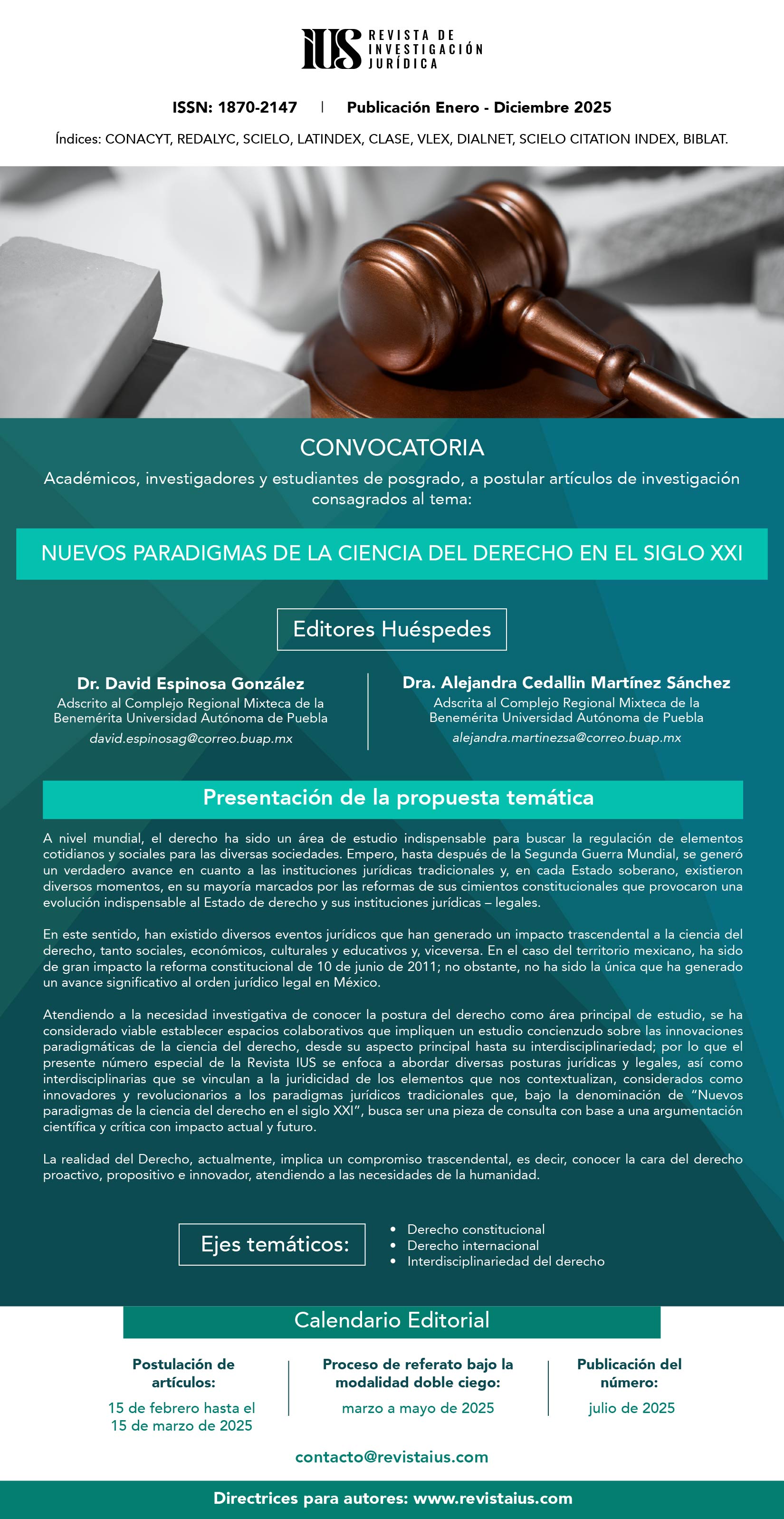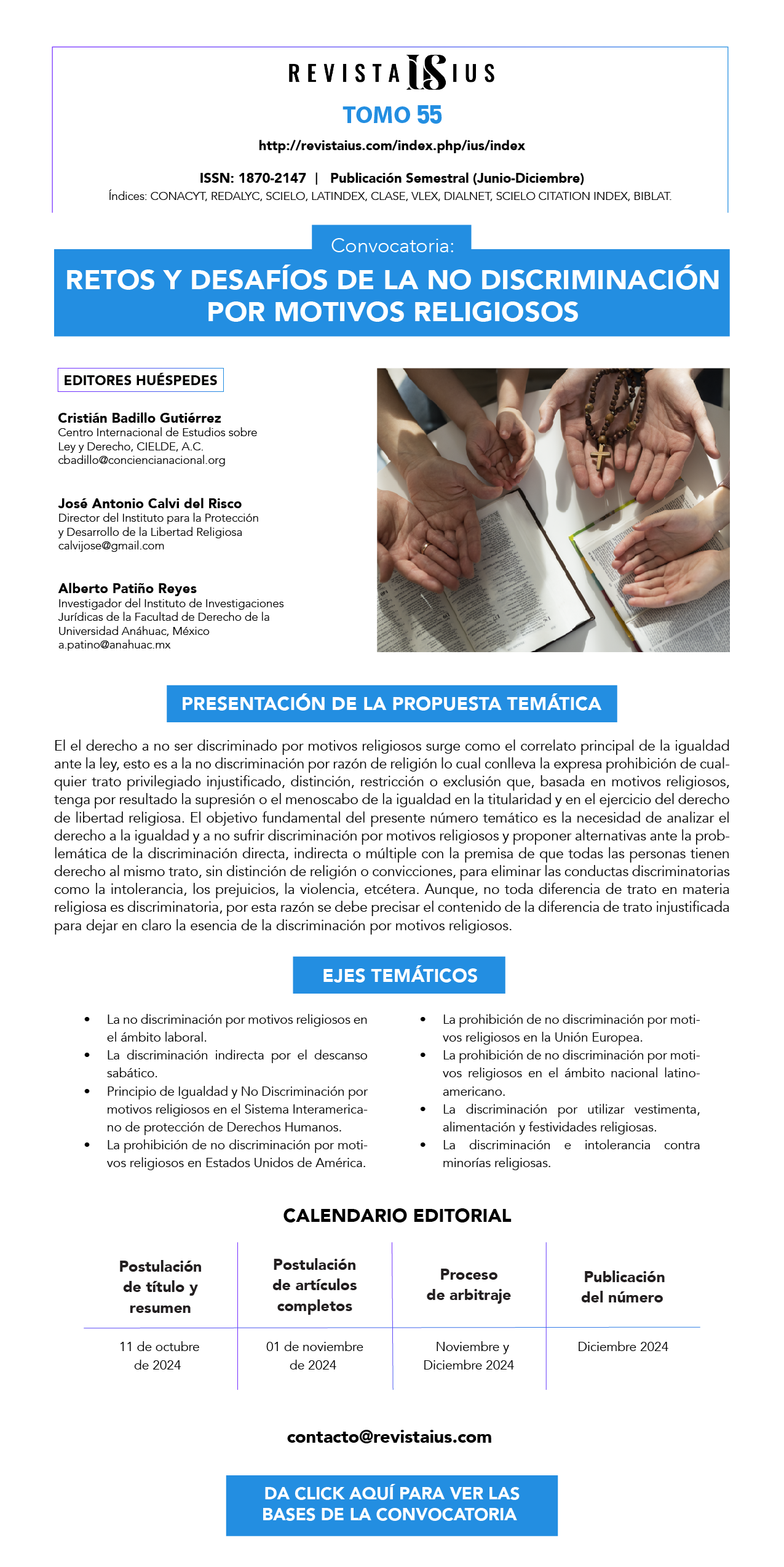Does the Inviolability of Archives Lead to a Catch-22 Situation?
DOI:
https://doi.org/10.35487/rius.v11i40.2017.342Keywords:
Confidentiality, fight against corruption, human rights violations, international organizations.Abstract
In contrast to Joseph Heller’s novel ‘Catch-22’, the illogical or paradoxical situation arising from the privilege of inviolability of archives in international organisations’ cooperation with national in the fight against fraud and corruption
is one of different legal orders that are not necessarily aligned from the outset. National law enforcement and judicial authorities have to respect the privilege of inviolability of archives enjoyed by international organisations. They may neither interpret the privilege restrictively without taking full account at the same
time of the purpose of privileges, i.e. the orderly and independent operation of international organisations, nor generally limit the privilege in any other way. It therefore lies in the hands of international organisations themselves to limit the risk of a catch-22 situation arising from the privilege of inviolability of archives
in their cooperation with national authorities. However, the onus is not only on international organisations. Any reasonable use of the privilege presupposes that national law enforcement and judicial authorities acknowledge its existence and deal with it respectfully.
Downloads
References
Articles of Agreement of the International Bank for Reconstruction and Development, UNTS, vol. 2, p. 13.
Articles of Agreement of the International Development Agency, UNTS, vol. 439, p. 249.
Carpanelli, Elena, “On the Inviolability of Diplomatic Archives and Documents: The 1961 Vienna Convention on Diplomatic Relations to the Test of Wikileaks”, Rivista di diritto internazionale, vol. 98, 2015, p. 834.
Charter of Fundamental Rights of the European Union, OJ C 202, 7.6.2016, p. 389.
Convention on the Privileges and Immunities of the United Nations, UNTS, vol. 1, p. 15.
Court of Appeal for England and Wales, R. (Bancoult) v. Secretary of State for Foreign and Commonwealth Affairs (No. 3), 2014 EWCA Civ 708, 1 W.L.R. 2921.
Court of Justice of the European Union, Judgment of 17 June 1981, Case 113/80, Commission v. Ireland, EU:C:1981:139.
Daher, Ayman & Sarhan, Alan, “World Bank Group v Wallace: International Organizations’ Immunities and their Involvement in the Fight Against Corruption”. Disponible en: http://www.brettonwoodslaw.com/world-bank-group-v-wallace-international-organizations-immunities-and-their-involvement-in-the-fight-against-corruption.
Decision of the European Central Bank of 4 March 2004 on public access to European Central Bank documents, OJ L 80, 18.3.2004, p. 42.
European Court of Human Rights, Judgment of 18 February 1999, Beer and Regan v. Germany, Merits, App No 28934/95, echr 6, 1999.
European Court of Human Rights, Judgment of 18 February 1999, Waite and Kennedy v. Germany, Merits, App No 26083/94, echr 13, 1999.
Herdegen, Matthias, “Interpretation in International Law”, en Rüdiger Wolfrum (ed.), Max Planck Encyclopedia of Public International Law. Disponible en: http://opil.ouplaw.com
Inter-American Court of Human Rights, Judgment of 25 November 2003, Myrna Mack Chang v. Guatemala, Series C, No. 101.
Inter-American Court of Human Rights, Judgment of 29 November 2006, La Cantuta v. Peru, Series C, No. 162.
Inter-American Court of Human Rights, Judgment 26 September 2008, Tiu Tojín v. Guatemala, Series C, No. 190.
Inter-American Court of Human Rights, Judgment of 23 November 2009, Radilla Pacheco v. Mexico, Series C, No. 209.
Inter-American Court of Human Rights, Judgment of 24 November 2010, Gomes Lund et al. v. Brazil, Series C, No. 219.
Möldner, Mirka, “International Organizations or Institutions, Privileges and Immunities”, en Rüdiger Wolfrum (ed.), Max Planck Encyclopedia of Public International Law. Disponible en: http://opil.ouplaw.com
Muller, Alexander Samuel, International Organizations and their Host States, Aspects of their Legal Relationship, La Haya, Kluwer, 1994.
Muller, Alexander Samuel, “Immunities of icty Staff Members, Assets and Archives before the icty”, en Richard May, et al. (eds.), Essays on icty Procedure and Evidence in Honour of Gabrielle Kirk McDonald, La Haya, Kluwer, 2001, p. 439.
Orakhelashvili, Alexander, “State Immunity in National and International Law: Three Recent Cases Before the European Court of Human Rights”, Leiden Journal of International Law, vol. 15, 2002, p. 703.
Proposal for a Council Regulation on the establishment of the European Public Prosecutor’s Office, com (2013) 534 final.
Protocol on the Privileges and Immunities of the European Union, OJ C 202, 7.6.2016, p. 266.
Regulation (ec) No. 1049/2001 of the European Parliament and of the Council of 30 May 2001 regarding public access to European Parliament, Council and Commission documents, OJ L 145, 31.5.2001, p. 43.
Regulation (eu, Euratom) No. 883/2013 of the European Parliament and of the Council of 11 September 2013 concerning investigations conducted by the European Anti-Fraud Office (olaf) and repealing Regulation (ec) No. 1073/1999 of the European Parliament and of the Council and Council Regulation (Euratom)No. 1074/1999, OJ L 248, 18.9.2013, p. 1.
Supreme Court of Canada, World Bank Group v. Wallace, 2016, scc 15, 2016 1 S.C.R. 207. Disponible en: https://scc-csc.lexum.com/scc-csc/scc-csc/en/item/15915/index.do
Vienna Convention on Diplomatic Relations, UNTS, vol. 500, p. 95.
Vienna Convention on Consular Relations, UNTS, vol. 596, p. 261.
Vienna Convention on the Law of the Treaties, UNTS, vol. 1155, p. 331.
Wickremasinghe, Chanaka, “International Organizations or Institutions, Immunities before National Courts”, en Rüdiger Wolfrum (ed.), Max Planck Encyclopedia of Public International Law. Disponible en: http://opil.ouplaw.com
Wolfrum, Rüdiger, “Cooperation, International Law of”, en Rüdiger Wolfrum (ed.), Max Planck Encyclopedia of Public International Law. Disponible en: http://opil.ouplaw.com
Published
Issue
Section
License
Revista IUS, published by the Legal Sciences Institute of Puebla A.C., is distributed under the Creative Commons Attribution-NonCommercial 4.0 International (CC BY-NC 4.0) license.
We authorize collaborators to upload a copy of their published work on their personal websites or any Open Access repository, provided that Revista IUS is specifically cited as the original source, indicating the year and issue of the respective example and adding the link to the webpage on which this publication can be freely consulted in toto and without charge: http://www.revistaius.com
Readers are free to:
Share, copy and redistribute the material via any medium or format.
The licensor cannot revoke these freedoms as long as you follow the license terms.
Under the following terms:
Attribution: You must give appropriate credit, provide a link to the license, and indicate if changes were made.
You may do so in any reasonable manner, but not in any way that suggests the licensor endorses you or your use.
NonCommercial – You may not use the material for commercial purposes.
If you remix, transform or build upon the licensed material, its distribution is not permitted.
Charges for managing articles: Revista IUS will not charge for receiving, processing or publishing articles (Article Processing Charge, or APC) submitted by authors.





